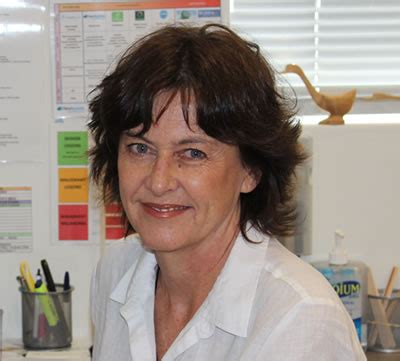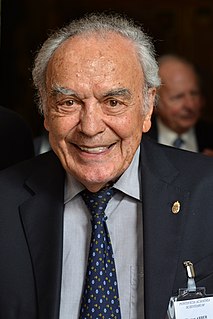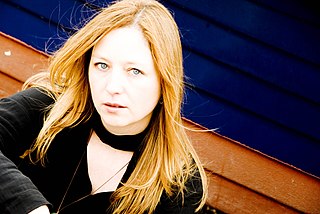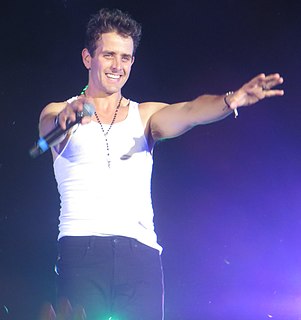A Quote by Anthony Doerr
We all come into existence as a single cell, smaller than a speck of dust. Much smaller. Divide. Multiply. Add and subtract. Matter changes hands, atoms flow in and out, molecules pivot, proteins stitch together, mitochondria send out their oxidative dictates; we begin as a microscopic electrical swarm. The lungs the brain the heart. Forty weeks later, six trillion cells get crushed in the vise of our mother’s birth canal and we howl. Then the world starts in on us.
Quote Topics
Add
Atoms
Begin
Birth
Brain
Canal
Cell
Cells
Changes
Come
Crushed
Dictates
Divide
Dust
Electrical
Existence
Flow
Forty
Get
Hands
Heart
Howl
Later
Lungs
Matter
Mitochondria
Molecules
Mother
Much
Multiply
Our
Out
Proteins
Send
Single
Six
Smaller
Speck
Starts
Stitch
Subtract
Than
Then
Together
Trillion
Us
Weeks
World
Related Quotes
We are not made up, as we had always supposed, of successively enriched packets of our own parts. We are shared, rented, occupied. At the interior of our cells, driving them, providing the oxidative energy that sends us out for the improvement of each shining day, are the mitochondria, and in a strict sense they are not ours.
We inherit every one of our genes, but we leave the womb without a single microbe. As we pass through our mother's birth canal, we begin to attract entire colonies of bacteria. By the time a child can crawl, he has been blanketed by an enormous, unseen cloud of microorganisms - a hundred trillion or more.
By the time we get to the 2040s, we'll be able to multiply human intelligence a billionfold. That will be a profound change that's singular in nature. Computers are going to keep getting smaller and smaller. Ultimately, they will go inside our bodies and brains and make us healthier, make us smarter.
Originally, the atoms of carbon from which we're made were floating in the air, part of a carbon dioxide molecule. The only way to recruit these carbon atoms for the molecules necessary to support life-the carbohydrates, amino acids, proteins, and lipids-is by means of photosynthesis. Using sunlight as a catalyst the green cells of plants combine carbon atoms taken from the air with water and elements drawn from the soil to form the simple organic compounds that stand at the base of every food chain. It is more than a figure of speech to say that plants create life out of thin air.
In this model, the sun is a very tiny speck of dust indeed-a speck less than a three-thousandth of an inch in diameter ... Think of the sun as something less than a speck of dust in a vast city, of the earth as less than a millionth part of such a speck of dust, and we have perhaps as vivid a picture as the mind can really grasp of the relation of our home in space to the rest of the universe.
The old idea is that when tragedy strikes or when an obstacle blocks us, there are only two possibilities. We either become a smaller person or we become a bigger person. If it's a real life change you cannot come out the same. So therefore, you're either going to come out smaller or you're going to rise up and ultimately come out of it a bigger person.
Although a biologist, I must confess I do not understand how life came about... I consider that life only starts at the level of a functional cell. The most primitive cells may require at least several hundred different specific biological macro-molecules. How such already quite complex structures may have come together, remains a mystery to me. The possibility of the existence of a Creator, of God, represents to me a satisfactory solution to this problem.
So if we're all quarks and electrons ..." he begins. What?" We could make love and it would be nothing more than quarks and electrons rubbing together." Better than that," I say. "Nothing really 'rubs together' in the microscopic world. Matter never really touches other matter, so we could make love without any of our atoms touching at all. Remember that electrons sit on the outside of atoms, repelling other electrons. So we could make love and actually repel each other at the same time.
There are thousands of proteins in the cells, some of them very large chains of molecules. And the cell doesn't function if one of those chains of molecules isn't there, and you start looking at the complexity of life and the mystery of life, and then start thinking about things like the twenty universal constants, that if any one of them from Plank's minimum to the mass of a proton, if one of them is the tiniest bit off, there would be no life or possibility of it in the universe.
Most of the different types of cells in our body die and are replaced every few weeks or months. However, neurons, the primary cell of the nervous system, do not multiply (for the most part) after we are born. That means that the majority of the neurons in your brain today are as old as you are. This longevity of the neurons partially accounts for why we feel pretty much the same on the inside at the age of 10 as we do at age 30 or 77.






































